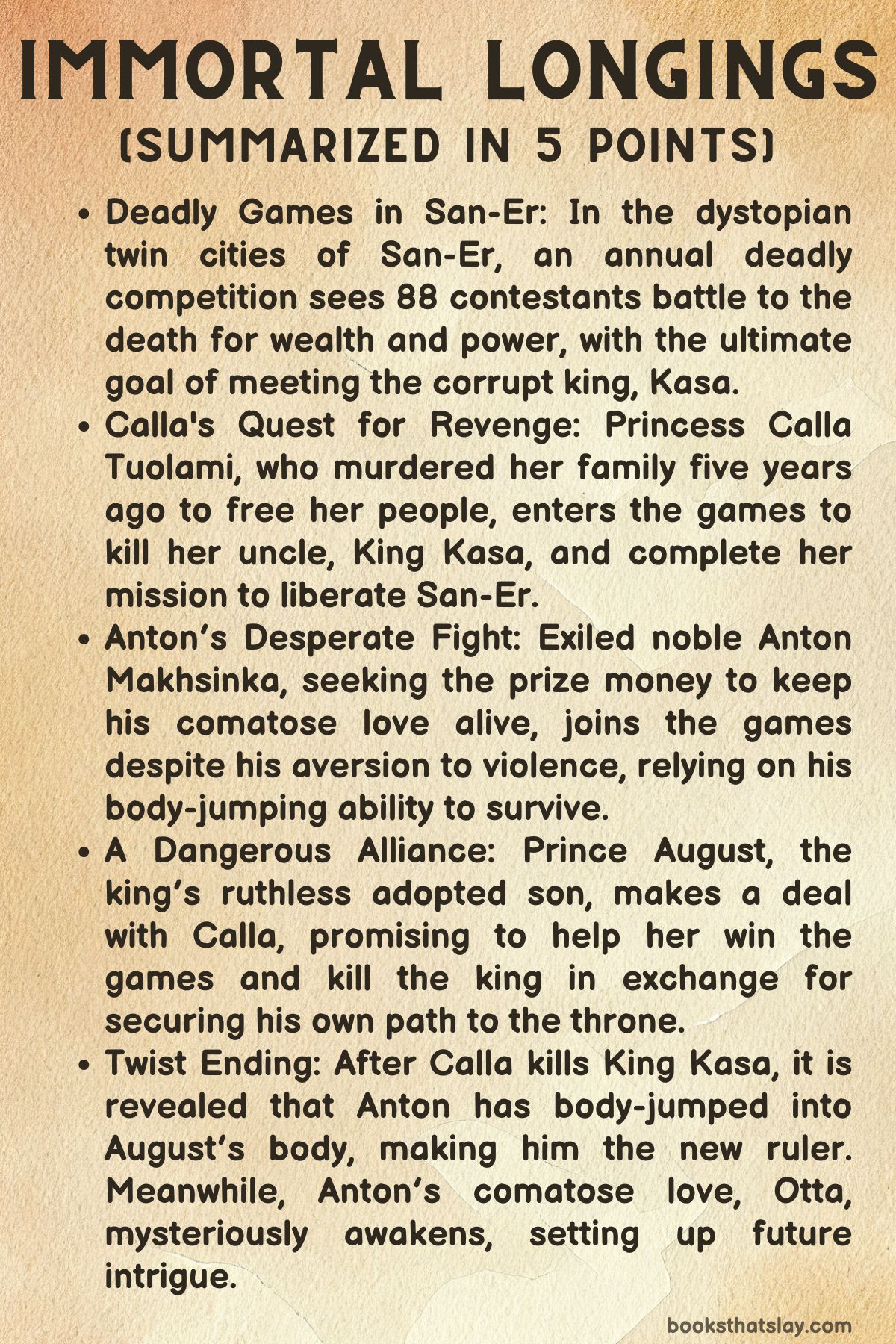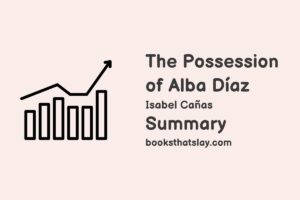Immortal Longings Summary, Characters and Themes
Immortal Longings by Chloe Gong marks the author’s venture into adult fantasy, spinning a dark, intense tale set in a dystopian world where body-jumping magic collides with political intrigue and gladiator-style games.
Inspired by Shakespeare’s Antony and Cleopatra, this first book in the Flesh and False Gods series focuses on two deeply complex characters navigating a cutthroat competition, personal sacrifices, and their desires for revenge and survival. As the city of San-Er crumbles under its corrupt rule, the protagonists must reckon with love, power, and betrayal in a world where no one is safe, not even from themselves.
Summary
In the twin cities of San-Er, a deadly game determines who among its impoverished citizens can rise above the squalor and win the ultimate prize: wealth, power, and a chance to meet the king. Every year, 88 contestants enter this brutal competition, knowing only one will survive.
Among them this year is Princess Calla Tuolami, who has spent five years in hiding after slaying her royal family in a quest to liberate her people. With her uncle, King Kasa, now ruling the merged cities of San-Er, Calla has one singular goal—kill him and finish what she started.
Calla enters the games under a false identity, her mind fixed on using the event as her means to get close enough to assassinate the king.
But her path is not easy.
To win the competition, she must outlast the other contestants, navigate deadly alliances, and confront her inner demons as she questions whether her brutal methods truly serve her people or only corrupt her further.
Anton Makhsinka, once a noble of San-Er, enters the games for very different reasons. Exiled after a tragedy seven years ago, Anton’s life has become a relentless struggle to keep his comatose childhood love alive.
Her medical bills are mounting, and the prize money from the games is his last hope to fund her care. Unlike Calla, Anton has avoided violence his whole life, relying on his ability to body-jump—temporarily inhabiting other people’s bodies—to survive.
But now, facing the deadly stakes of the competition, he must use all his cunning and resourcefulness to avoid becoming a target while inching closer to victory.
Their fates become intertwined when Prince August, the adopted son of King Kasa, enters the fray with his own ambitions. August is ruthless and determined, believing only he can save the kingdom from ruin.
He sees in Calla an opportunity to strike at his adoptive father, and he strikes a dangerous deal with her—if she wins and kills the king, she will ensure his place as the new ruler of San-Er. Together, they form a fragile alliance built on mistrust and manipulation, each with their own hidden agendas.
As the games intensify, the harsh reality of survival begins to weigh on Calla and Anton. Both characters must confront not only the external threats of their ruthless competitors but also their growing feelings for each other, which complicates their already precarious situation.
With every death, the stakes rise, and the city of San-Er watches with bloodthirsty anticipation.
In the end, after countless betrayals and shifting alliances, Calla reaches the palace and fulfills her mission by killing King Kasa.
But a final twist reveals that Anton, who had been eliminated from the competition, has body-jumped into Prince August’s body, positioning himself as the new ruler.
As Calla faces this unexpected betrayal, the story takes an even darker turn when Anton’s comatose love, Otta, mysteriously awakens in the morgue, setting the stage for a haunting and unpredictable continuation of the series.

Characters
Calla Tuolami
Calla is the novel’s main protagonist, a conflicted and determined character with a dark past. Five years before the story begins, she murdered her own family, believing that by doing so, she could liberate her people from the tyranny of her royal bloodline.
This decision has weighed heavily on her, creating a deep internal conflict. Calla’s mission in life is to kill her uncle, King Kasa, who has seized control of both cities, San and Er, after her failed coup.
Her character is fascinating in its complexity. Calla believes that to save her people, she must become a monster, sacrificing her humanity for a higher cause.
She exhibits an intense sense of duty and conviction, but this also makes her emotionally detached and often brutal. While she has trained herself for years in combat and strategy, she constantly questions whether she has crossed the line into complete ruthlessness.
Calla struggles with vulnerability and suppresses her emotions, unwilling to let others see her as weak, a trait that isolates her. This internal conflict is a driving force throughout the novel, adding depth to her character as she balances her goal of assassination with her diminishing sense of morality.
However, Calla’s persona lacks significant growth throughout the story. From the beginning, she is already hardened and prepared for the trials she faces, so her character arc focuses more on the nuances of her moral choices than any major transformation.
Her relationship with Anton is perhaps the most revealing aspect of her emotional depth. Her feelings for him complicate her mission and force her to confront what she is willing to sacrifice for her cause.
Anton Makhsinka
Anton serves as a counterbalance to Calla’s character, with his more pragmatic and non-violent approach to life. He is a nobleman exiled from San-Er after a tragedy that occurred seven years ago, during which his beloved, Otta, fell into a coma.
Anton has spent his years in exile desperately trying to keep Otta alive, paying for her care in the hopes that she will one day wake up. Unlike Calla, who thrives in the chaos of the deadly games, Anton avoids direct confrontation whenever possible.
He survives by “jumping” into other people’s bodies, a tactic that reflects his preference for manipulation and strategic thinking over brute force. Anton’s motivations are driven by love and loyalty rather than power or revenge.
His deep connection to Otta is the most humanizing aspect of his character, making him appear more relatable than Calla. However, his tendency to avoid violence does not mean he is without ruthlessness.
He is willing to do whatever it takes to win the money needed for Otta’s survival, even if it means forming dangerous alliances or manipulating others. This moral ambiguity makes Anton a compelling character, as his ethics shift based on his desperate circumstances.
Anton’s relationship with Calla adds emotional depth to the novel. Their bond is complicated by mistrust and their opposing worldviews, which become a focal point in their development throughout the book.
Prince August
Prince August is a central figure in the political machinations of San-Er. Though he is not a protagonist in the traditional sense, his presence looms large over the events of the story.
As the adopted son of King Kasa, August is deeply entangled in the royal family’s power struggles. Like Calla, he desires to overthrow King Kasa, but his methods are more calculated and strategic.
He is depicted as cold and ruthless, willing to manipulate people and situations to achieve his goals. August’s character is intriguing because, despite his ambition and cunning, there is an air of mystery surrounding his true motivations.
He appears to be driven by the desire to save the kingdom, but his personal interests and long-term plans are often hidden from the reader. This makes him a somewhat enigmatic figure whose true intentions are revealed in small, tantalizing details.
The reader is left questioning how much of August’s altruism is genuine and how much is simply a means to gain power. His relationship with both Calla and Anton is crucial to the story.
August views Calla as a tool he can use to take down the king, but there are moments when he reveals a deeper understanding of her internal struggles. His connection to Anton is more complex, as they share a past that complicates their current political rivalry.
August’s role as a manipulator and puppet master behind the scenes adds an extra layer of intrigue to the plot.
King Kasa
King Kasa is the main antagonist of the novel, ruling over the twin cities of San and Er with an iron fist. While he does not have as much “screen time” as the other characters, his presence looms large throughout the story.
Kasa represents everything that Calla and August despise: a corrupt ruler who has plunged the kingdom into poverty and chaos. His tyrannical rule and his fear of Calla’s return to the city serve as a catalyst for much of the action in the novel.
Though his character is not deeply explored in this first book, King Kasa’s impact is felt in every corner of the plot. He is a symbolic figure of the broken system that Calla seeks to dismantle, but the personal stakes are higher because of his familial connection to her.
This dynamic of personal revenge intertwined with a political coup adds layers to Calla’s motivation and the novel’s themes of power and corruption.
Otta
Though Otta spends most of the novel in a coma, she is a pivotal character, particularly for Anton. As his beloved, Otta represents Anton’s greatest motivation and his personal stakes in the competition.
The love and loyalty he has for her drive many of his decisions, and the hope of reviving her gives him a goal beyond survival. Otta also serves as a symbol of the emotional consequences of the power struggles within San-Er, a victim of the palace’s machinations.
In the novel’s climactic twist, when Anton jumps into August’s body, it becomes clear that Otta’s storyline is far from over. Her awakening in the morgue hints at larger implications for both Anton and the future of the series.
Though she is physically absent for most of the story, Otta’s shadow looms large over the emotional and political stakes of the novel.
Themes
The Fragility of Moral Absolutism in Revolutionary Violence
One of the key themes in Immortal Longings is the fragility of moral absolutism when it comes to revolutionary violence, particularly as embodied in the character of Calla. From the outset, Calla presents herself as an unflinchingly ruthless protagonist, determined to rid the world of the tyrannical rule her family represents.
Her willingness to kill her parents and enter the blood-soaked games highlights the dangers of self-justified violence, often predicated on the belief that some ends—freedom for the people, liberation from tyranny—justify any means. However, as the narrative unfolds, Calla is forced to confront the emotional and psychological toll that her actions take on her sense of self.
She begins to grapple with the haunting question of whether her relentless pursuit of justice has turned her into the very monster she sought to destroy. This theme pushes the reader to consider the complexity of revolutionary ideals: when does the line between hero and tyrant blur?
Calla’s inner turmoil reflects a broader commentary on how moral absolutism—rooted in violent rebellion—often collapses under the weight of its own ethical contradictions.
The Ethical Dissonance in Political Alliances and Manipulation
Another deeply resonant theme is the ethical dissonance that arises from forming political alliances based on mutual manipulation rather than shared values or trust. The relationship between Calla and August encapsulates this theme, as their partnership is built not on ideological alignment or personal loyalty but on the pragmatic exchange of power.
August, a calculated and duplicitous figure, promises to help Calla achieve her goal of winning the games and overthrowing the king. Yet, the strategic nature of their alliance introduces a tension between ends and means, where both characters are willing to sacrifice their personal morals for political gain.
This dynamic is not limited to Calla and August, as it extends to Anton’s involvement as well. His motivation to save his comatose beloved leads him to compromise his own ethical boundaries, participating in a deadly competition that he otherwise would have avoided.
The novel paints a bleak picture of political machinations, where alliances are less about moral alignment and more about leveraging others to achieve personal ends. The shifting allegiances and manipulation between characters challenge the reader to question whether true loyalty can exist in a world where survival and power supersede all other considerations.
Identity and the Existential Crisis of Physical Transcendence Through “Jumping”
The body-jumping mechanic in Immortal Longings serves as an intricate metaphor for the fluidity and instability of identity, as well as the existential crisis that arises from physical transcendence. In this world, the ability to “jump” into another person’s body introduces profound questions about the nature of the self.
Anton, in particular, embodies this theme; having lost his own body, he is condemned to perpetually inhabit others, making his sense of identity both malleable and fragile. The novel explores how identity is tied not only to the body but also to the soul, as the act of jumping risks losing one’s “Chi,” or essence, to a more powerful body.
This introduces a metaphysical dilemma—can the self truly remain coherent when detached from its physical form? Moreover, Calla’s identity as a royal fugitive who must hide her true self to survive further complicates this theme.
She constantly shifts between her public persona as a contestant in the games and her private mission to assassinate the king. The existential weight of this theme is intensified by the realization that identity, like power, is contingent and fluid, with characters often struggling to maintain a stable sense of self in a world that allows for such extreme bodily disassociation.
The Dehumanization of Combatants and the Commodification of Death in State-Sanctioned Spectacle
The structure of the games in Immortal Longings introduces a harrowing commentary on the dehumanization of individuals through state-sanctioned violence and the commodification of death as a form of public entertainment. The games are an annual event where participants are drawn into a death match, mirroring the gladiatorial contests of ancient Rome and the dystopian spectacles of modern fiction, such as The Hunger Games.
What sets Immortal Longings apart is its explicit focus on how the games function as a tool for the ruling powers to maintain control and distract the masses. The violence in the games is both literal and symbolic: it serves not only to eliminate perceived threats but also to reinforce the hierarchy that devalues human life in the service of political stability.
The contestants, including Calla and Anton, are reduced to mere bodies—disposable, interchangeable, and stripped of their humanity in the eyes of the spectators and the state. This commodification of human life raises unsettling questions about the ethics of entertainment in a society where violence and death are normalized and celebrated.
By depicting a world in which the state manipulates the masses through ritualized death, the novel critiques the dangers of a desensitized populace that finds both solace and distraction in the suffering of others.
Romantic Disenchantment and the Collapse of Intimacy Amidst Political Warfare
Unlike traditional romantic subplots that offer escapism or emotional reprieve, the romance in Immortal Longings is marked by disenchantment and dysfunction, serving as a microcosm for the larger theme of intimacy collapsing under the weight of political warfare. The relationship between Calla and Anton is devoid of tenderness or genuine emotional connection, instead driven by physical attraction and necessity.
The novel deliberately subverts romantic tropes by presenting a romance that is more transactional than transformative. Calla and Anton’s interactions are laced with mistrust and manipulation, reflecting the broader atmosphere of betrayal that permeates the novel’s political landscape.
Their romance is emblematic of how love and intimacy become casualties in a world dominated by power struggles and survivalist instincts. This collapse of intimacy mirrors the characters’ disillusionment with themselves and their political ambitions, ultimately painting a picture of love as something that can no longer flourish in the context of perpetual violence and subterfuge.
The Illusion of Autonomy in a Predetermined System of Power Dynamics
The novel further explores the illusion of autonomy within a system where power dynamics are predetermined and individuals’ choices are constrained by forces beyond their control. While characters like Calla and Anton believe they are making autonomous decisions—whether to enter the games or kill the king—their actions are ultimately circumscribed by the larger structures of power that govern San Er.
The games themselves are a form of entrapment, presenting the illusion of freedom while systematically eliminating those who pose a threat to the ruling regime. This theme is compounded by the presence of August, whose ability to manipulate events from behind the scenes demonstrates how those in power orchestrate the fates of others, often without their knowledge.
Even as the characters fight for their freedom, they remain pawns in a larger system that dictates their every move. The novel critiques the idea of free will, suggesting that true autonomy is a myth in a world where the mechanisms of power are so deeply entrenched that even rebellion becomes a predetermined part of the system.


